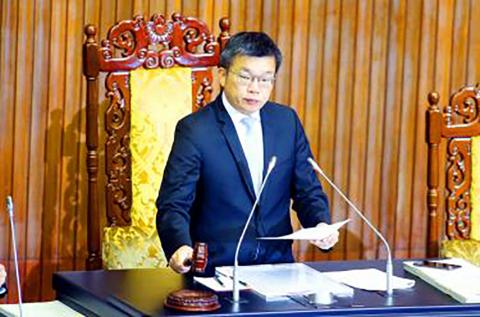Democratic Progressive Party (DPP) lawmakers yesterday decried an alleged Chinese investigation into political donations made by Taiwanese businesses that operate in China, saying that the democratic value of transparency should not be used for political oppression.
The Chinese government is allegedly looking into whether Taiwanese corporations with operations in China have donated to the pan-green camp — which in Taiwan is public information — and aims to have the firms make “political statements” akin to that made by Taiwan-based cafe and bakery chain 85°C (85度C), a source said yesterday.
The cafe on Aug. 15 declared its support for the so-called “1992 consensus” and the peaceful development of cross-strait ties when Chinese netizens threatened to boycott the chain after one of its branches in Los Angeles allegedly gave President Tsai Ing-wen (蔡英文) a gift package while she was en route to Paraguay and Belize.

Photo: CNA
Some Taiwanese corporations have already approached pan-green politicians and legislators “seeking help,” the source said.
Asked for comment, Deputy Legislative Speaker Tsai Chi-chang (蔡其昌) said: “While we encourage the transparency of political donations to civil servants, the identity of Taiwanese corporations in China that make donations should be protected.”
Beijing intrusions just deepen Taiwanese loathing for China and such actions “are ill-willed acts to undermine cross-strait development,” he added.
Information made public under the Political Donations Act (政治獻金法) should not make donors a target of political suppression, DPP Legislator Lai Jui-lung (賴瑞隆) said.
Any such action seeking to counter democratic values and influence economic activity should be condemned, Lai said.
The 85°C incident serves as a lesson on Chinese intrusion into the private affairs of companies and Beijing continuing the practice as a way to oppress Taiwanese corporations in China would only further alienate Taiwanese, he said.
National security-related agencies should have a stronger response to political threats made by an authoritarian China against Taiwan’s democracy, Lai said.
Domestic political parties should not collude with China to oppress Taiwanese democratic values, which were hard-fought and could be lost if allowed to slip away, Lai added.
The declaration of political donations should not lead to donors’ right to privacy being breached, a DPP party official said on condition of anonymity, adding that the information should only be revealed if criminal activity is suspected, or in other “special” circumstances.
Asked whether the alleged breach by China would result in fewer donations to the pan-green camp, DPP Legislator Kuan Bi-ling (管碧玲) said the move by Beijing would be ineffective and only cause China to lose further support in Taiwan, while DPP Legislator Tsai Yi-yu (蔡易餘) said it would not only fail to cut off funding for the party, but also “help the campaigns of pan-green candidates.”
DPP Legislator Rosalia Wu (吳思瑤) said the alleged Chinese actions were absurd and constituted a direct intrusion into Taiwanese politics and elections, adding that such actions would only have adverse effects.

SECURITY: As China is ‘reshaping’ Hong Kong’s population, Taiwan must raise the eligibility threshold for applications from Hong Kongers, Chiu Chui-cheng said When Hong Kong and Macau citizens apply for residency in Taiwan, it would be under a new category that includes a “national security observation period,” Mainland Affairs Council (MAC) Minister Chiu Chui-cheng (邱垂正) said yesterday. President William Lai (賴清德) on March 13 announced 17 strategies to counter China’s aggression toward Taiwan, including incorporating national security considerations into the review process for residency applications from Hong Kong and Macau citizens. The situation in Hong Kong is constantly changing, Chiu said to media yesterday on the sidelines of the Taipei Technology Run hosted by the Taipei Neihu Technology Park Development Association. With

CARROT AND STICK: While unrelenting in its military threats, China attracted nearly 40,000 Taiwanese to over 400 business events last year Nearly 40,000 Taiwanese last year joined industry events in China, such as conferences and trade fairs, supported by the Chinese government, a study showed yesterday, as Beijing ramps up a charm offensive toward Taipei alongside military pressure. China has long taken a carrot-and-stick approach to Taiwan, threatening it with the prospect of military action while reaching out to those it believes are amenable to Beijing’s point of view. Taiwanese security officials are wary of what they see as Beijing’s influence campaigns to sway public opinion after Taipei and Beijing gradually resumed travel links halted by the COVID-19 pandemic, but the scale of

A US Marine Corps regiment equipped with Naval Strike Missiles (NSM) is set to participate in the upcoming Balikatan 25 exercise in the Luzon Strait, marking the system’s first-ever deployment in the Philippines. US and Philippine officials have separately confirmed that the Navy Marine Expeditionary Ship Interdiction System (NMESIS) — the mobile launch platform for the Naval Strike Missile — would take part in the joint exercise. The missiles are being deployed to “a strategic first island chain chokepoint” in the waters between Taiwan proper and the Philippines, US-based Naval News reported. “The Luzon Strait and Bashi Channel represent a critical access

Pope Francis is be laid to rest on Saturday after lying in state for three days in St Peter’s Basilica, where the faithful are expected to flock to pay their respects to history’s first Latin American pontiff. The cardinals met yesterday in the Vatican’s synod hall to chart the next steps before a conclave begins to choose Francis’ successor, as condolences poured in from around the world. According to current norms, the conclave must begin between May 5 and 10. The cardinals set the funeral for Saturday at 10am in St Peter’s Square, to be celebrated by the dean of the College